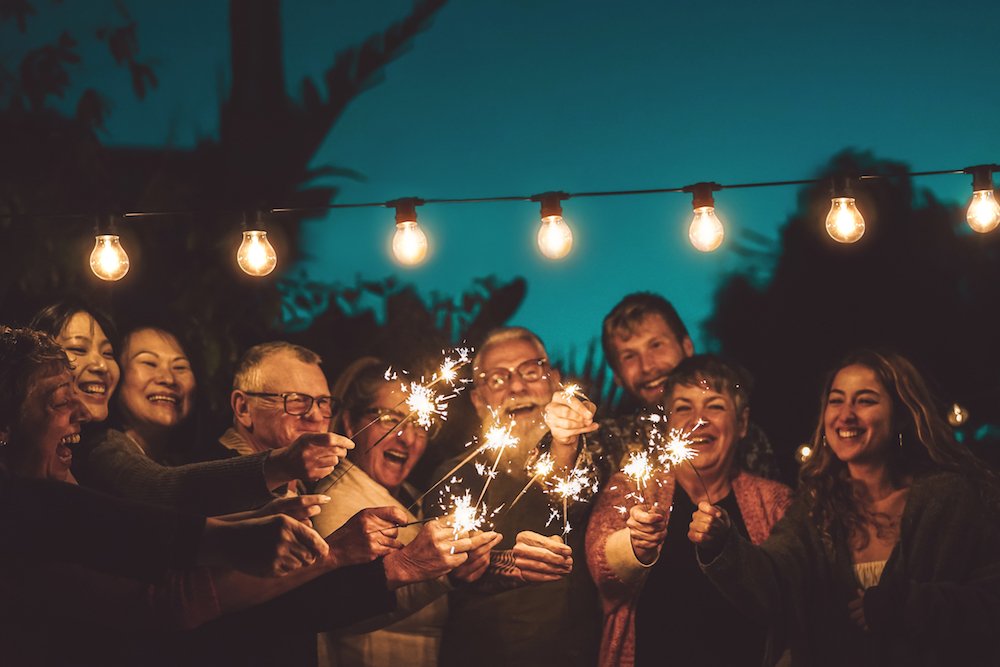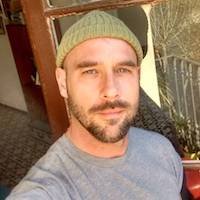As age gap friendships become increasingly common, Calvin Holbrook muses over the benefits older friends can bring to our lives, and how they can bring happiness to different generations.
Living in London as a bright young thing during my 20s, plenty of my friends were older than me; indeed, many were already in their 30s or 40s. As someone who always felt older than their years, I lapped up my older friends' knowledge, broader cultural references and maturity.
More recently, after hitting the big 4-0 myself, I struck up an age gap friendship with a guy in his 60s. I became particularly inspired by Jack, a senior American that stayed with me for a month in Barcelona. He was up out of bed at dawn, off exploring the city all day long, and out making new friends – and going on dates! I was in awe of his youthful spirit, energy and devil-may-care attitude – it was infectious and we clicked instantly.
Similarly, I have no shame in saying my best older friend is probably my own mum: she may be 70, but sometimes we laugh together so much we both end up with our cheeks aching and tears in our eyes.
Of course, admitting to having much older, adult friends when you’re a teenager would have probably resulted in tears of a different kind: from your friends shunning you for being such a loser (your best mate is your mum?).
However, even in today’s youth-driven society, there are signs that the shaming of age gap friendships may be over, and that they're actually on the rise. This can only be a good thing, because, as we’ll discover, there are many benefits of having much older – or, conversely, younger – friends.
Age Gap Friendships: the New Generation?
Although there's currently little hard data on the subject, generation gap friendships appear to be flourishing. Numerous heartwarming stories have appeared in the press in praise of having older friends. Indeed, thanks to social media it’s now even easier to meet people with similar interests, meaning that age differences are increasingly irrelevant.
RELATED: Understanding the Power of Friends
And, with accommodation in crisis in major cities worldwide, younger people are increasingly moving in with older generations – such as the Baby Boomers – that often have spare rooms in their already mortgage-free homes.
With almost 75 per cent of older people struggling with loneliness and isolation in the UK, intergenerational living has to be a win-win situation: giving the older person company and extra income, and the younger friend a more affordable place to live and someone inspirational to learn from. 
Age gap friendships can be illuminating
In fact, the benefits of age gap friendships extend further. “Bridging the generation gap not only increases the friend pool, but it also expands and supports mental well-being,” Anna Kudak, Ph.D., co-author of What Happy Women Do told Good Housekeeping magazine. She continued, “friendships with older and younger people help broaden your perspective, which in turn allows you to have compassion and empathy in your day-to-day life.”
And, there’s no reason why age gap friendships cannot be as close as those with friendships of similar ages. Psychology professor Robert Kurzban from the University of Pennsylvania has studied factors that affect friendship quality. He found that matching age was not a predictor of friendship closeness or quality.
Older Friends: 8 Benefits of Age Gap Friendships
While generation gap friendships may require a little more effort and understanding, it’s clear the rewards are many. So, here’s a deeper look at the benefits of having a much older – or younger – friend.
1. Widening perspective and losing preconceived notions
Younger generations often assume the lives of older people are boring. Likewise, older generations often think of Millennials as both entitled and self-interested. Of course, these are stereotypes and false assumptions. Developing age gap friendships has the potential to widen your perspective around different age groups and see the truth beyond stereotypes.
2. Sharing valuable wisdom and insights
Older friends have already ‘been there, done that’, meaning they have plenty of useful knowledge and experience younger generations can tap into. Older friends can help you navigate work life, financial or family difficulties, break-ups and other major life issues because – more likely than not – they’ve already experienced them. Haven’t got a clue about how to get a mortgage, split up with an unsuitable partner, or arrange a funeral? Your older friend can probably help.
“Developing age gap friendships has the potential to widen your perspective around different age groups and see the truth beyond stereotypes.”
Meanwhile, the younger generation tend to be more fluent in technology and issues around popular culture, meaning older friends can certainly benefit from their knowledge in these areas, picking up relevant new skills, especially in our increasingly online society. In fact, older friends might be learning abut a whole new world which is alien (yet exciting) to them.
RELATED: Finding Your Tribe – the 7 Steps You Need to Take
3. Expand horizons and share similar interests
Many of our friendships develop from shared experiences, such as being at school, work or through friends-of-friends. However, many of these people don’t necessarily share our interests and hobbies. As we engage in and pursue our interests over our lifetime, those that share our passions play a deeper role in our lives.
This is where generation gap friendships often come into play. Because whether you’re into running, knitting or playing the cello, you’re sure to find inspiring people of all ages and make older – and younger – friends. It’s a great chance to connect around your passions and develop a deeper bond, learning or teaching around your specialist hobby.
Age UK's befriending brought Rose and Sarah together Age UK/YouTube
4. Sincerity and respect
Older generations usually have a deeper sense of mutual sincerity and respect than younger generations. Additionally, according to researchers at the University of California, San Francisco, older generations are also less prone to drama, as they perceive more complexity in situations than younger people, who often go off the handle more easily.
• HAVE YOUR SAY! What Are the Qualities of a Best Friend? •
Younger people can therefore expect to have more sincere, frank and potentially more meaningful conversations with older friends (which perhaps they wouldn't get with friends of a similar age). Likewise, older friends will expect respect and sincerity in return from you, so it's great chance to develop these skills.
5. Their confidence may inspire you
The elderly can sometimes come across opinionated to younger generations, and that’s because they usually are! That's because with age comes confidence: less caring about what others think, or the need to impress.
“Older friends can help you navigate financial difficulties, break-ups, and other major life issues because they’ve already experienced them.”
“Older people not only have the benefit of experience, they’re also less afraid of the opinions of others — so are more likely to say what they think,” Mark Vernon, author of The Meaning of Friendship, told the Daily Mail. “Their view often throws something unexpected into the mix.” Such confidence may inspire the younger friend in their discussions around life.
6. Observing a different view point
Furthermore, age and growing older usually helps to shape our opinions, so another benefit of age gap friendships is the chance to see something from an entirely different point of view, one perhaps you would have never considered previously.
Being exposed to the ideas of older generations offers food for thought and the chance to expand your mind in a new way. Likewise, younger friends can teach the older partner in age gap friendships different perspectives from a modern age.
7. They aren’t your parents
Although a few of us may have very open relationships with our parents, being able to discuss our sex lives in intimate detail is probably off-limits! Not so for our older friends, who also probably won’t judge you or try to guide you in a way your parent might.
RELATED: The 8 Types of Friends We All Need
Indeed, older friends can be a bit like our grandparents or a friendly aunt or uncle: letting you do the things your parents forbid. And they will also probably enjoy indulging in these type of conversations that will help to keep them young at heart, too.
8. You’ll get an awesome cultural lesson
You can learn so much about history and culture from older friends in age gap friendships (and vice versa). Older people possess a wealth of knowledge and life experience that can be tapped into and enjoyed: Millennials and Generation X-ers can discover new music, film, artists, as well as fascinating stories about the past that can inspire them or widen life horizons.
Likewise, Baby Boomers and beyond may be curious to enjoy learning about the latest trends in music and fashion. In fact, all different age groups can get recommendations and new references that they cannot get from their own age group: what's not to love?
Ideas on how to make older friends
So, if reading about the benefits of age gap buddies has got you itching to pan out your friendship pool, how can you make some new older friends? Of course, friendships are best when they're natural, without being forced, and – if you pay attention – there are chances to make friends of different age groups every day.
Cookin' up an age gap friendship
But, specifically, you can try a few things to find friends that are that bit more mature. Firstly, as mentioned earlier, join a club around one of your hobbies: there will be people of old ages present, providing a unique chance to meet older pals.
Secondly, get to know your neighbours in your building or local area that are older. Instead of just saying 'hi' in the corridor, invite them in for a chat over a coffee. Similarly, in the UK for example, charities such as Age UK run befriending services that pair younger people from the community with lonely, older people, helping to build community bonds and relieve isolation in the elderly.
And, of course, using social media to join online groups is a great way to find friends of all different ages.
The takeaway: age gap friendships
It's clear that if we limit our pool of potential friends to those of our own age, we're missing out on all kinds of brilliant and inspiring folk we could be developing an important social bond with. For younger people, having an older friend or three means we have someone mature we can learn from and ask for life advice when needed.
And for that older friend in any generational gap friendship, having a younger buddy will potentially ease isolation and also help to keep them connected in our fast-paced society, keeping them feeling forever young. As the old saying goes, age is definitely just a number, so if you don't already have some older friends, start building some new connections today! ●
Main image: shutterstock/simona pilolla 2, shutterstock/AlessandroBiascioli, shutterstock/Bojan Milinkov
happiness.com | The fine art of being: learn, practice, share
Are you a happiness.com member? Join free now and:
■ enjoy our happiness magazine
■ share and support in our happiness forum
Written by Calvin Holbrook
 Calvin edits our magazine, as well being an artist and travel lover. He also loves hiking, nature, swimming, yoga, sweaty dancing, and all things vintage!
Calvin edits our magazine, as well being an artist and travel lover. He also loves hiking, nature, swimming, yoga, sweaty dancing, and all things vintage!






Join the conversation
You are posting as a guest. If you have an account, sign in now to post with your account.